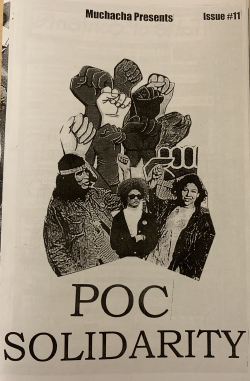Vulnerable populations include patients who are racial or ethnic minorities, children, elderly, socioeconomically disadvantaged, underinsured or those with certain medical conditions. Members of vulnerable populations often have health conditions that are exacerbated by unnecessarily inadequate healthcare. (National Institutes of Health)
Combine the above terms with terms like these:
*Note that you have to specifically say 'African American' or 'Black' before medical care otherwise the database defaults to White. White is seen as the norm.
 POC solidarity #11
by
Daisy Salinas
This collaborative zine includes essays. poems, and photography about intersectional racial justice movements and building solidarity across different marginalized groups. Specific topics include global resistance movements, fighting anti-blackness, trans women of color, incarceration, and police violence.
POC solidarity #11
by
Daisy Salinas
This collaborative zine includes essays. poems, and photography about intersectional racial justice movements and building solidarity across different marginalized groups. Specific topics include global resistance movements, fighting anti-blackness, trans women of color, incarceration, and police violence.
